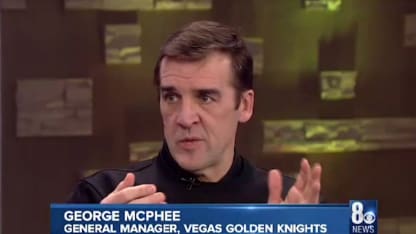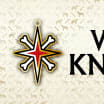RELATED: Get tickets to see the Golden Knights
Peter Brand, of course, being a fictitious character (based in reality), but the entire struggle within the A's in the movie based on true events at the start of the 2002 MLB season.
Hill's character is in opposition to the A's old-school baseball scouts, who loathe the new system, preferring to evaluate players by more traditional metrics.
Watch: Youtube Video
While this battle was often forged in baseball front offices in the early 2000s, it's only become in vogue in hockey over the past five years, with an outcome on where the mainstream sits on the issue still in question.
In a recent interview with CBS Channel 8 in Las Vegas, Golden Knights general manager George McPhee weighed in with some thoughts on the analytics debate when discussing his approach to evaluating players.
RELATED: George McPhee, 7 fun facts
"It's about watching players on video," McPhee said. We've actually had some people come in to teach us interview techniques, so when we interview these kids, we can get to where we need to be with what kind of character do they have.
"And then applying analytics, with all the math. We have data providers that after a single game, we have 80,000 raw data points that we have to turn into some kind of language that we understand, and we apply all that. That's where we'll get our elite players from. And that's where you try to hit the home runs in the (entry) draft.
"There's a real methodology to it. The draft isn't a random thing. It takes a lot of work. We've come up with a way that I thought worked really well in Washington, and will work here. We're doing a lot of mock drafts for the expansion draft. But our elite players are going to have to come through the (entry) draft."
RELATED: Expansion Draft rules
Woah.
McPhee certainly gives us a lot to pick through there.
Among them:
\McPhee's staff has received outside instruction on how to best interview (entry) draft-eligible prospects. Whereas interviewing players for the purposes of determining character has long been in practice, McPhee's staff is attempting to go outside the box as to find an advantage on how to best uncover information in interviews from expert interviewers.
\McPhee's staff will utilize analytics. Perhaps more interesting is a glimpse into how substantial the amount of analytic information his staff receives is. 80,000 raw data points for a single game implies receiving upwards of 1,300 pieces of information for every minute played in a game. Or in other words, about 22 stats per second of each game. And despite the complicated nature of these numbers, this subject isn't something McPhee's staff will shy away from.
*Through utilizing these alternative approaches, McPhee's staff believes there's a system to help identify diamonds in the rough during the NHL Entry Draft, which will help the team acquire elite players in non-elite draft slots.
In his wide-ranging interview with CBS, McPhee also discussed Behind The Vegas Ice, the process of hiring a coach and the team's preseason schedule.
Watch the full interview below



















